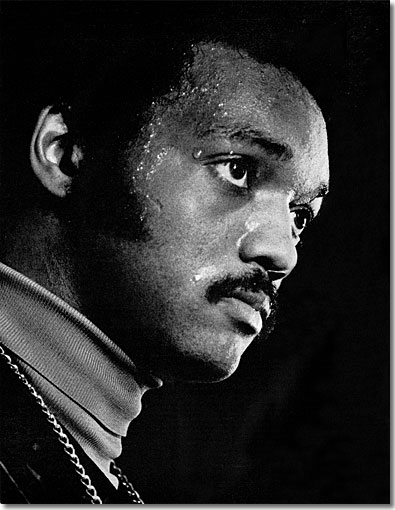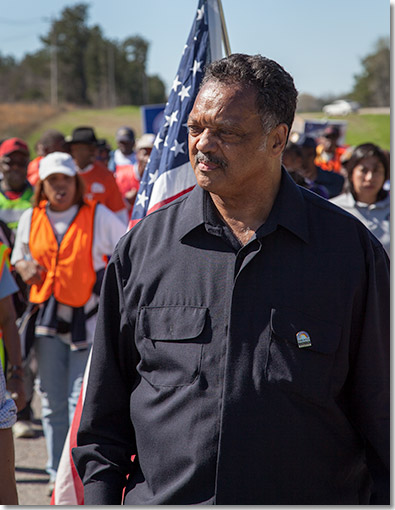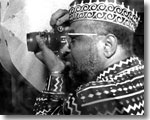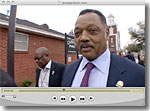Rev. Jesse Jackson – "A New Kind of Black Cat"
 Jackson stirs Los Angeles churchgoers with an amalgam of ghetto humor, Southern Baptist pyrotechnics, race language. Photo by Chester Higgins, Jr. |

Rev. Jesse Jackson marching from Selma to Montgomery AL during the Jubilee Days, March 2012, protesting efforts to cut back on voting rights. Photo by Bill Ganzel. |
|
|
In June 1971, LOOK magazine recorded an encounter between Sen. Edward Kennedy and Rev. Jesse Jackson. Kennedy "stuck out his hand and exchanged banalities [with Jackson]. Kennedy acted like a man running for the Presidency. Jackson, typically, acted like a man who is President." The article went on to say Jackson is "the closest thing to a national leader that has surfaced on today's fragmented civil rights scene. Tough talking, fast-stepping Jesse Jackson is as different from the conventional notion of a black minister as a Maserati is from a Dodge." Kennedy ran for President in 1980. In 1984 and 1988, Rev. Jackson became the second national black candidate (after Shirley Chisholm) to run for President. In '84, he won five primaries and caucuses and 18 percent of the vote for the Democratic nomination. In 1988, he won 21 percent of the popular vote for the nomination. |
In March, 2011, Rev. Jackson revisited the site of one of his earliest major civil rights actions, the Selma to Montgomery voting rights march. In 1965, he was working with Dr. Martin Luther King and the Southern Christian Leadership Council (SCLC). Shortly after the march, he moved to Chicago to head the SCLC Operation Breadbasket feeding ghetto children. They used their economic power to promote black businesses. He was at the motel in Memphis when Dr. King was assassinated in 1968. Later, he had a falling out with SCLC and started Operation PUSH in Chicago. In 1984, he organized the Rainbow Coalition that later merged with Operation PUSH. This year, in a short interview after a Sunday service at Brown Chapel in Selma, Rev. Jackson remembered that time and how the democracy activists in Egypt borrowed the techniques of non-violence from the 1960s civil rights movement. I have a request in for an interview in April 2011. |






